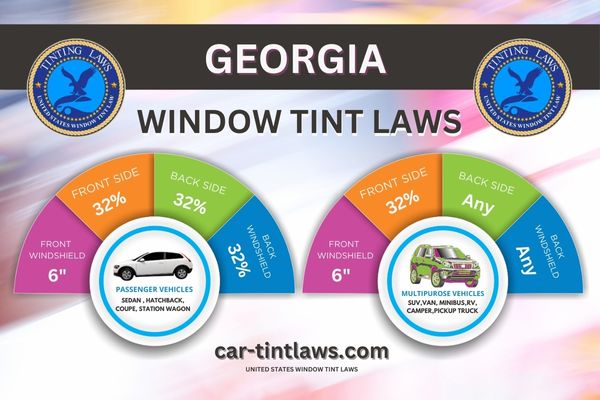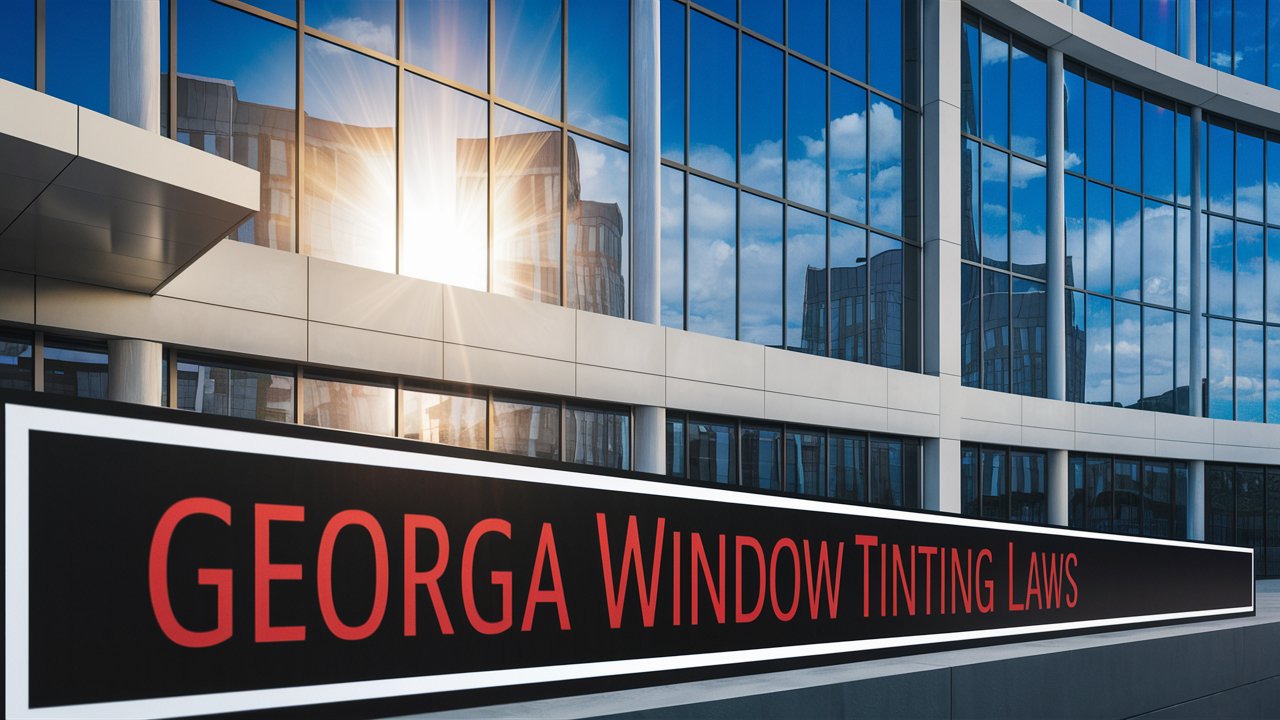Did you know that Georgia’s window tinting laws are among the strictest in the country, particularly for passenger cars?
If you’re planning to tint your windows, you’ll need to guarantee your vehicle allows over 32% light transmission for all side windows and back glass, with specific requirements for SUVs, trucks, and vans.
Compliance stickers are mandatory, and there are hefty fines for violations.
Curious about the medical exemptions and how these laws are enforced? Let’s explore the essential details to make sure your vehicle meets Georgia’s legal standards.
Window Tint Darkness in Georgia
When considering window tint darkness in Georgia, it’s essential to understand that passenger cars must have a tint that allows more than 32% of light to pass through all side windows and the back glass.
For SUVs, trucks, and vans, only the front doors are subject to this 32% VLT requirement, while the rest of the windows have no specified darkness limit.
Additionally, the windshield can feature non-reflective tint on the top 6 inches to help reduce glare without affecting overall visibility.
Tint darkness for sedans:
- Windshield: Non-reflective tint is allowed on the top 6 inches of the windshield.
- Front Side windows: Must allow more than 32% of light in.
- Back Side windows: Must allow more than 32% of light in.
- Rear Window: Must allow more than 32% of light in.
Tint darkness for SUV and Vans:
- Windshield: Non-reflective tint is allowed on the top 6 inches of the windshield
- Front Side windows: Must allow more than 32% of light in
- Back Side windows: Any shade can be used
- Rear window: Any shade can be used
Window Tint Reflection in Georgia
When considering tint reflection in Georgia, you’ll need to be aware of the specific limits for different types of vehicles.
For sedans, as well as SUVs and vans, the state mandates that tint reflection must not surpass 20% on both front and back side windows.
This regulation aims to minimize glare and guarantee clear visibility for all drivers.
Tint reflection for sedans:
- Front Side windows: Must not be more than 20% reflective.
- Back Side windows: Must not be more than 20% reflective.
Tint reflection for SUV and vans:
- Front Side windows: Reflectiveness limited to no more than 20%.
- Back Side windows: Reflectiveness limited to no more than 20%.
Other Georgia window tint rules and regulations
- Side Mirrors: No restrictions.
- Restricted Colors: In Georgia, all tint colors are permitted.
- Certificates: Manufacturers of film need to certify the film they sell in the state. Ask your dealer if they are using certified film.
- Stickers: The sticker/label of compliance to identify legal tinting is required between the film & glass on each tinted window.
- Medical Exceptions: Georgia permits medical exemptions for special tint. For more details about the specific terms of the exemption, consult GA state law.
- Penalties: Violating Georgia’s tint laws can result in a ticket, with fines varying based on the specific violation. It’s crucial to ensure compliance to avoid fines and meet state standards.

Medical Exemptions for Window Tint Rules in Georgia
Individuals with specific medical conditions can obtain exemptions from standard window tint regulations in Georgia by providing a physician or optometrist-signed certificate.
This means that if you have a condition that requires protection from sunlight, you can legally have darker tint on your vehicle’s windows.
The first step in this process is to obtain documentation from your physician, indicating the medical necessity for the exemption.
This certificate must outline why the standard regulations are insufficient for your health and safety needs.
In Georgia, compliance with the medical exemption process is essential.
You’ll need to make sure all documentation is correctly filled out and submitted to the appropriate authorities.
This level of adherence helps maintain safety on the roads, as it ensures that only those with a genuine medical necessity are granted these exemptions.
Importantly, this also helps law enforcement recognize legitimate cases where darker window tints are permitted.
Safety and health considerations are at the forefront of this process.
The state recognizes that certain medical conditions warrant deviations from the standard window tint regulations.
By following the proper channels and providing the necessary proof, you can guarantee that your exemption is both valid and respected.
Window tint medical exemption form (.pdf file)
Georgia Window Tint Ticket Cost
Getting caught with illegal window tint in Georgia can lead to fines up to $1,000 and even potential jail time.
First-time offenders might receive a warning or face fines ranging from $25 to $100.
However, subsequent offenses can result in fines exceeding $200, emphasizing the significance of adhering to Georgia window tint laws.
These laws stipulate that the front windshield must allow more than 32% of light in (VLT), with similar requirements for the front side windows.
The rear windows can have a darker tint, but it still must comply with specific VLT standards.
If you need a medical exemption for darker tints due to health conditions, you must carry proper documentation.
Professional installation by knowledgeable dealers, like The Tint Guy in Atlanta, helps secure your vehicle meets legal tint standards and avoids costly fines or legal issues.
Understanding the window tint ticket cost and compliance with Georgia regulations is vital.
By adhering to the legal tint requirements, you can prevent unnecessary expenses and avoid potential legal trouble.
Always check the VLT percentages and consult with professionals to secure your vehicle’s tint aligns with state laws.
Georgia Climate and Sun Exposure
Given Georgia’s humid subtropical climate, you’re exposed to significant sun throughout the year, which can lead to high levels of UV radiation.
Proper window tinting can help reduce heat buildup inside your vehicle, offering UV protection and potentially lowering the risk of skin cancer.
Understanding the benefits of window tinting regarding UV protection, heat reduction efficiency, and skin cancer prevention is essential for making informed decisions about your vehicle’s window tint levels.
UV Protection Benefits
Georgia’s intense sun exposure makes UV protection from window tinting essential for safeguarding both your skin and your vehicle’s interior.
With the state’s high levels of sun exposure, it’s pivotal to ponder how harmful UV rays can affect you and your car.
Window tinting offers notable UV protection, which not only reduces the risk of skin damage but also prevents interior fading.
The Skin Cancer Foundation highlights the importance of UV protection in vehicles, recommending window films like LLumar to block harmful rays.
By installing window tinting, you can markedly reduce the amount of UV exposure you and your passengers receive, which is especially important given Georgia’s sunny climate.
This is a vital factor in minimizing the risk of skin cancer and other UV-related health issues.
Moreover, UV protection from window tinting helps maintain the appearance of your vehicle’s interior by preventing fading and cracking caused by prolonged sun exposure.
This means your car will look better for longer, preserving its value and comfort.
In Georgia, where the sun’s intensity can be unyielding, investing in quality window tinting is a pragmatic and protective measure for your health and your vehicle.
Heat Reduction Efficiency
Beyond UV protection, window tinting also excels in reducing the intense heat that Georgia’s climate brings, enhancing comfort and efficiency.
Georgia’s hot summers and high sun exposure make high-quality window tinting essential for maintaining comfortable temperatures inside your vehicle.
By blocking UV rays and reducing solar heat gain, window tinting significantly lowers the interior temperature, making your driving experience much more pleasant.
When you opt for high-quality window tinting, you’re investing in effective heat reduction that helps maintain a cooler environment inside your vehicle.
This reduction in heat means you won’t have to rely as heavily on your air conditioning system, leading to noticeable energy savings over time.
With less strain on your vehicle’s air conditioning, you’ll also potentially extend the lifespan of your vehicle’s cooling system.
In addition to making your ride more comfortable, window tinting in Georgia plays an essential role in enhancing overall efficiency.
By minimizing solar heat gain, you can keep your vehicle cooler, even when it’s parked under the scorching sun.
This combination of comfort and practicality makes high-quality window tinting a smart investment for anyone dealing with Georgia’s intense climate and sun exposure.
Skin Cancer Prevention
With Georgia’s intense sunlight, window tinting becomes a crucial measure to protect your skin from harmful UV rays and reduce the risk of skin cancer.
The state’s sunny climate and high levels of sun exposure notably increase the risk of skin cancer.
By using automotive window tinting, you can block a significant amount of harmful UV rays that contribute to skin damage and skin cancer.
Llumar Window Films, endorsed by the Skin Cancer Foundation, offer effective UV protection, making them a dependable choice for safeguarding your skin.
Georgia’s window tinting laws allow medical exemptions for darker tints, recognizing that some individuals need additional UV protection due to specific medical conditions.
These exceptions ensure that everyone can benefit from improved safeguarding measures.
References
Georgia Code section 40-8-73.1: Tinting of windows or windshields
State of Georgia – Ammended Window Tint Laws
Frequently Asked Questions
What Is the Darkest Legal Tint in Ga?
You’re wondering about the darkest legal tint in GA. For passenger cars, it’s 32% VLT.
This balance guarantees the best darkness for car visibility, heat reduction, UV protection, and privacy concerns, complying with tint regulations.
Is 15% Tint Illegal in Ga?
Yes, 15% tint is illegal in GA for front side windows. Consider other tinting options that meet the 32% VLT requirement.
While it offers heat reduction and privacy benefits, violating this law brings legal consequences. Seek professional installation.
Can You Get a Ticket for 20% Tint Georgia?
Wondering if you can get a ticket for 20% tint in Georgia? Yep, you can. Legal limits say 20% is the max.
Enforcement procedures are strict, and penalties for violations are hefty. Benefits of tinting? Sure, but beware!
Can You Be Pulled Over for Window Tint in Georgia?
Yes, you can be pulled over for tint visibility issues in Georgia. Tint enforcement guarantees compliance with tint regulations.
If your tint violates these rules, you could face tint fines unless you have valid tint exemptions for tint safety.
Conclusion
You can guarantee your vehicle’s compliance and avoid hefty fines.
Remember that passenger cars need over 32% light transmission for side windows and back glass, and SUVs, trucks, and vans must have 32% VLT for front doors.
Adherence to compliance stickers, manufacturer certification, and medical exemptions is essential.
Knowing these regulations helps you stay safe and legal on the road, protecting both you and other drivers.
